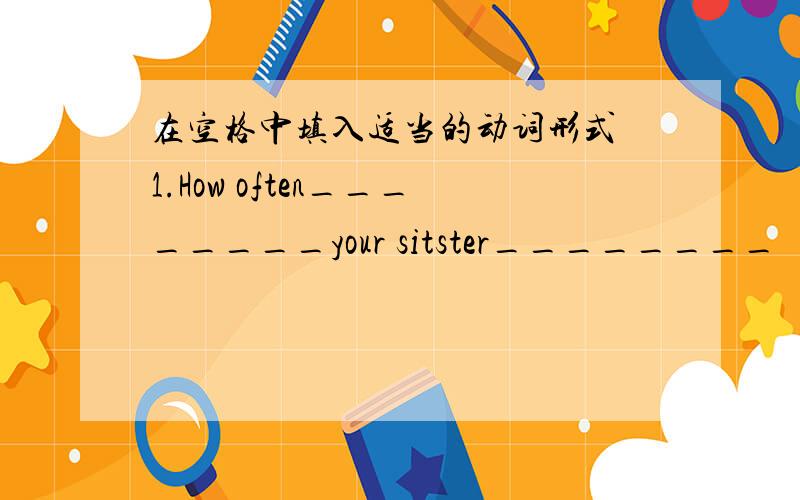在空格中填入适当的动词形式 1.How often________your sitster________ (visit) your grandma?在空格中填入适当的动词形式 1.How often________your sitster ________visit your grandma?2.Listen,somone________(sing)outside.Go and se
来源:学生作业帮助网 编辑:作业帮 时间:2024/04/30 11:15:31

在空格中填入适当的动词形式 1.How often________your sitster________ (visit) your grandma?在空格中填入适当的动词形式 1.How often________your sitster ________visit your grandma?2.Listen,somone________(sing)outside.Go and se
在空格中填入适当的动词形式 1.How often________your sitster________ (visit) your grandma?
在空格中填入适当的动词形式
1.How often________your sitster ________visit your grandma?
2.Listen,somone________(sing)outside.Go and see who it is.
3.The train to shanghai ________(leave)at 7:00.
4.—________you________(see)the film?—Yes,I________(see)it with my mum.
5.I________(study)english for about 4 years.
6.When ________you(come)tomorrow.
7.The twins ________(learn)to play the pinao now.
8.Little Kitty ________(live)in chengdu in 1995.
9.—Where________(be)you born?—I ________(be)born in Wuhan.
10.Look at the black clouds .It ________(rain)soon.
在空格中填入适当的动词形式 1.How often________your sitster________ (visit) your grandma?在空格中填入适当的动词形式 1.How often________your sitster ________visit your grandma?2.Listen,somone________(sing)outside.Go and se
1.does visit is singing leaves Have seen saw have studied will come are learning lived were was is going to
1. does...go to
2. is singing
3. leaves
4. Have...seen...saw
5. have studied
6. do...come
7. are learning
8. lived
9. were...was
10. is going to rain
1. does; /
2. is singing
3. leaves
4. have' seen, saw
5. have studied
6. will you come
7, are learning
8. lived
9.were ,was
10. is going to rain
1) does,visit
2) is singing
3) will leave/left/leaves
4) Have, seen, saw
5) have been studying
6) will, come
7) are learning
8) lived
9) were, was
10) is going to rain
1.How often (does) your sitster (go) visit your grandma?
2.Listen,somone(is singing)outside。Go and see who it is。
3.The train to shanghai(leaves)at 7:00.
4.—(Have) you(seen)the film? ...
全部展开
1.How often (does) your sitster (go) visit your grandma?
2.Listen,somone(is singing)outside。Go and see who it is。
3.The train to shanghai(leaves)at 7:00.
4.—(Have) you(seen)the film? —Yes,I(saw)it with my mum.
5.I (studied)english for about 4 years.
6.When (will) you(come)tomorrow.
7.The twins (are) (learning) to play the pinao now.
8.Little Kitty(lived)in chengdu in 1995.
9.—Where (were) you born? —I (was) born in Wuhan.
10.Look at the black clouds .It (will)(rain)soon.
收起
1.does .visit
2.is singing
3.leaves
4.did see saw
5.have studied
6.will come
7.are learning
8.lives
9.were was
10.will rain